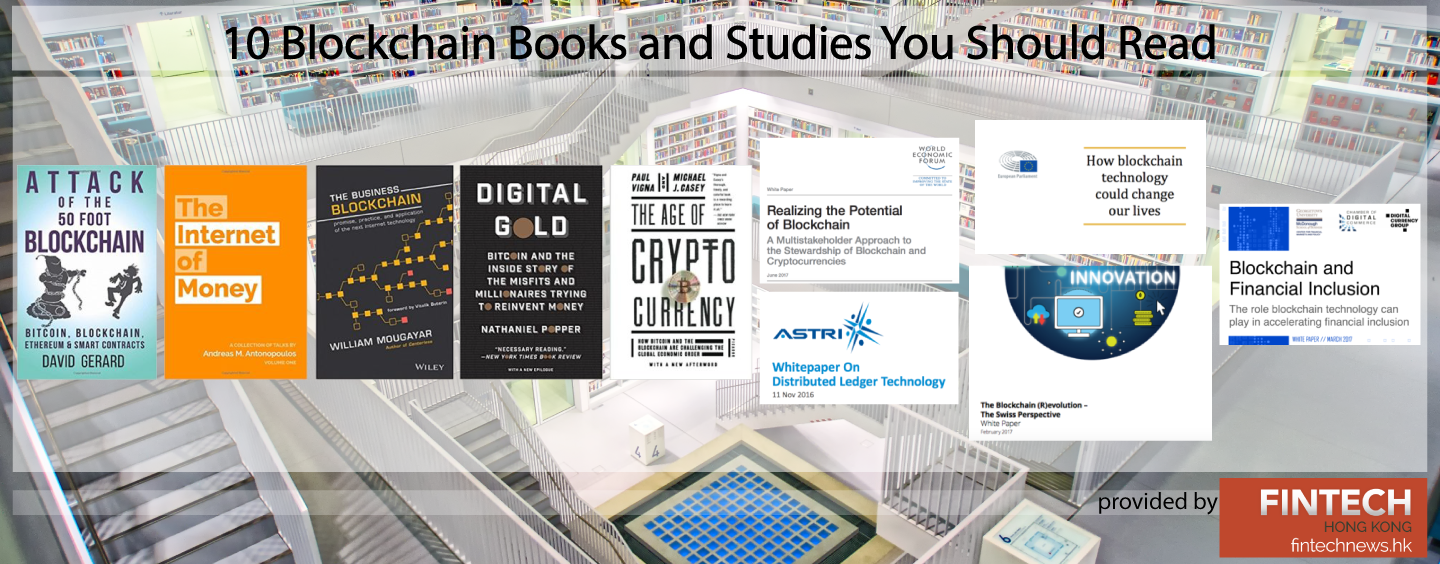Blockchain has become a buzzword in the business world with firms from diverse and varied industries all looking to harness the technology to increase efficiency and cut costs.
Interest in blockchain originally came from the banking and financial services industry but quickly grew to others to include transportation and logistics, e-government and digital identity, e-commerce and retail, as well as music and entertainment, among others.
To keep up with the rapidly evolving world of blockchain and cryptocurrency, we have selected ten must-read books and research papers on the subject that dive into the subject.
Blockchain books
Attack of the 50 Foot Blockchain: Bitcoin, Blockchain, Ethereum & Smart Contracts
July 2017
by David Gerard
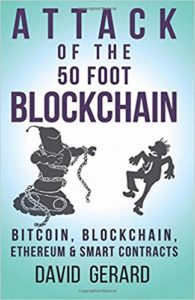 An experimental new Internet-based form of money is created that anyone can generate at home; people build frightening firetrap computers full of video cards, putting out so much heat that one operator is hospitalized with heatstroke and brain damage.
An experimental new Internet-based form of money is created that anyone can generate at home; people build frightening firetrap computers full of video cards, putting out so much heat that one operator is hospitalized with heatstroke and brain damage.
A young physics student starts a revolutionary new marketplace immune to State coercion; he ends up ordering hits on people because they might threaten his great experiment, and is jailed for life without parole.
Fully automated contractual systems are proposed to make business and the law work better; the contracts people actually write are unregulated penny stock offerings whose fine print literally states that you are buying nothing of any value.
The biggest crowdfunding in history attracts US$150 million on the promise that it will embody “the steadfast iron will of unstoppable code”; upon release it is immediately hacked, and US$50 million is stolen.
In Attack of the 50 Foot Blockchain, David Gerard covers the origins and history of Bitcoin to the present day, the other cryptocurrencies it spawned including Ethereum, the ICO craze and the 2017 crypto bubble, and the attempts to apply blockchains and smart contracts to business.
The book also includes a case study on blockchains in the music industry.
The Internet of Money
September 2016
by Andreas M. Antonopoulos
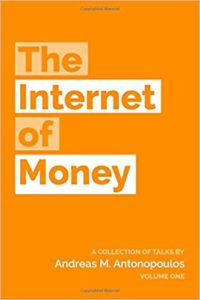 The Internet of Money dives into the why of bitcoin, examining and contextualizing the significance of bitcoin through a series of essays spanning the exhilarating maturation of this technology.
The Internet of Money dives into the why of bitcoin, examining and contextualizing the significance of bitcoin through a series of essays spanning the exhilarating maturation of this technology.
Bitcoin, a technological breakthrough quietly introduced to the world in 2008, is transforming much more than finance. Bitcoin is disrupting antiquated industries to bring financial independence to billions worldwide.
In this book, Andreas M. Antonopoulos, an information-security expert and author, explains why bitcoin is a financial and technological evolution with potential far exceeding the label “digital currency.”
He explores the technical functioning of the bitcoin network by illuminating bitcoin’s philosophical, social, and historical implications. As the Internet has essentially transformed how people around the world interact and has permanently impacted our lives in ways we never could have imagined, bitcoin – the Internet of money – is fundamentally changing our approach to solving social, political, and economic problems through decentralized technology.
The Business Blockchain: Promise, Practice, and Application of the Next Internet Technology
May 2016
by William Mougayar
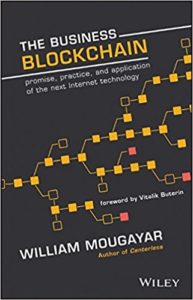 The Business Blockchain charts new territory in advancing the understanding of the blockchain.
The Business Blockchain charts new territory in advancing the understanding of the blockchain.
William Mougayar anticipates a future that consists of thousands, if not millions of blockchains that will enable not only frictionless value exchange, but also a new flow of value, redefining roles, relationships, power and governance.
In this book, Mougayar makes two other strategic assertions: first, the blockchain has polymorphic characteristics; its application will result in a multiplicity of effects; second, we shouldn’t ask ourselves what problems the blockchain solves but rather imagine new opportunities with blockchain and tackle even more ambitious problems.
The Business Blockchain aims to help technologists better understand the business potential of the blockchain, and help business minded people grasp the many facets of blockchain technology.
Digital Gold: Bitcoin and the Inside Story of the Misfits and Millionaires Trying to Reinvent Money
May 2016
by Nathaniel Popper
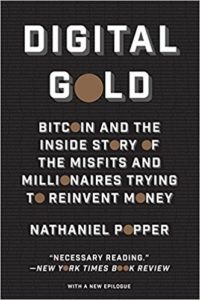 Digital Gold is New York Times reporter Nathaniel Popper’s history of Bitcoin, the landmark digital money and financial technology that has spawned a global social movement.
Digital Gold is New York Times reporter Nathaniel Popper’s history of Bitcoin, the landmark digital money and financial technology that has spawned a global social movement.
In this book, Popper charts the dramatic rise of Bitcoin and the fascinating personalities who are striving to create a new global money for the Internet age.
Believers from Beijing to Buenos Aires see the potential for a financial system free from banks and governments. More than just a tech industry fad, Bitcoin has threatened to decentralize some of society’s most basic institutions.
Digital Gold charts the rise of the Bitcoin technology through the eyes of the movement’s colorful central characters, including an Argentinian millionaire, a Chinese entrepreneur, Tyler and Cameron Winklevoss, and Bitcoin’s elusive creator, Satoshi Nakamoto.
The Age of Cryptocurrency: How Bitcoin and the Blockchain Are Challenging the Global Economic Order
January 2016
by Paul Vigna and Michael J. Casey
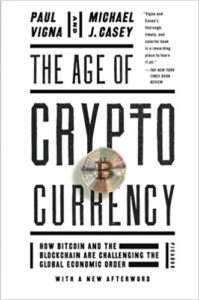 In The Age of Cryptocurrency, Wall Street journalists Paul Vigna and Michael J. Casey explore how cybermoney is poised to launch a revolution – one that could reinvent traditional financial and social structures while bringing the world’s billions of “unbanked” individuals into a new global economy.
In The Age of Cryptocurrency, Wall Street journalists Paul Vigna and Michael J. Casey explore how cybermoney is poised to launch a revolution – one that could reinvent traditional financial and social structures while bringing the world’s billions of “unbanked” individuals into a new global economy.
Cryptocurrency holds the promise of a financial system without a middleman, one owned by the people who use it and one safeguarded from the devastation of a 2008-type crash.
But bitcoin, the most famous of the cybermonies, carries a reputation for instability, wild fluctuation, and illicit business; some fear it has the power to eliminate jobs and to upend the concept of a nation-state. It implies, above all, monumental and wide-reaching change – for better and for worse. But it is here to stay, claim the authors.
In this book, Vigna and Casey demystify cryptocurrency and provide tools to better understand and navigate the cyber-economy.
Blockchain studies, research papers and reports
Realizing the Potential of Blockchain: A Multistakeholder Approach to the Stewardship of Blockchain and Cryptocurrencies
June 2017
Don Tapscott and Alex Tapscott
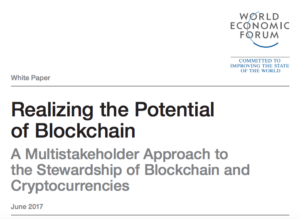 This WEF white paper, written by Don Tapscott and Alex Tapscott, explores the different types of networks and explains the core differences between the Internet of information as a network of similar networks and the blockchain as a balkanized Internet of value, where real assets are at stake.
This WEF white paper, written by Don Tapscott and Alex Tapscott, explores the different types of networks and explains the core differences between the Internet of information as a network of similar networks and the blockchain as a balkanized Internet of value, where real assets are at stake.
The paper covers the most urgent threats to this resource, which the authors view as governance challenges.
Unlike the Internet of information, which is a vast network of similar networks, this Internet of value requires stewardship at not just one level but three.
At the platform level, it looks at bitcoin’s scalability issue and energy consumption, Ethereum’s switch to proof-of-stake and crisis management by consensus, and Hyperledger’s call for both urgency and moderation around standards.
At the application level, it looks at the need for oversight, skilled talent and user-friendly interfaces.
At the overall ecosystem level, it looks at the need for a proper legal structure, regulatory restraint, diversity of viewpoints and scientific research in tandem with business development. It introduces each of the eight stakeholders in the ecosystem: innovators, venture capitalists, banks and financial services, developers, academics, non-governmental organizations (NGOs), government bodies, and users or citizens.
You can also read a summary here.
Whitepaper On Distributed Ledger Technology
November 2016
by the Hong Kong Applied Science and Technology Research Institute (ASTRI), commissioned by the Fintech Facilitation Office (FFO) of the Hong Kong Monetary Authority (HKMA)
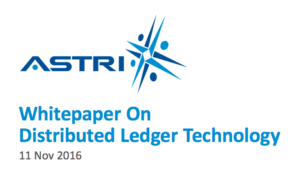 In this research paper, ASTRI provides an in-depth examination of distributed ledger technology (DLT), including an investigation into its potential, its risks, and its regulatory implications; and identifies possible applications of the technology to banking services by engaging in proof-of-concept work.
In this research paper, ASTRI provides an in-depth examination of distributed ledger technology (DLT), including an investigation into its potential, its risks, and its regulatory implications; and identifies possible applications of the technology to banking services by engaging in proof-of-concept work.
The paper is regarded as the first stage in a larger research project and aims to provide the fintech industry in Hong Kong with a reasonably comprehensive study of the key features, benefits, risks and potential of DLT.
It also includes the initial findings of the proof-of-concept work carried out on DLT applications in three areas: mortgage loan application, trade finance, and digital identity management.
You can read a summary here.
How blockchain technology could change our lives
February 2017
by Philip Boucher, Scientific Foresight Unit, European Parliamentary Research Service
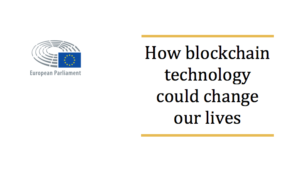 This report provides an accessible entry point for those in the European Parliament and beyond who are interested in learning more about blockchain development and its potential impacts.
This report provides an accessible entry point for those in the European Parliament and beyond who are interested in learning more about blockchain development and its potential impacts.
Its aim is to stimulate reflection and discussion of this complicated, controversial and fast-moving technology.
The report is non-sequential, so readers are invited to choose the sections that interest them and read them in any order.
Sections include an introduction to how blockchain technology works, how this technology could be deployed in various application areas, its potential impacts, and its implications for European policy. A concluding section presents some overall remarks and potential responses to blockchain development.
The Blockchain (R)evolution – The Swiss Perspective
February 2017
by Deloitte Switzerland
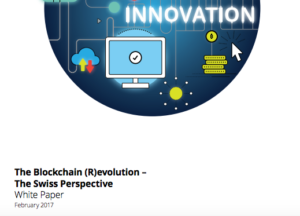 This white paper by Deloitte Switzerland focuses on how blockchain is seen by the Swiss market. The document explores how Switzerland could offer the blockchain community huge potential as a place in which this technology can be developed and used, of which the prominence of Zug’s Crypto Valley provides the most convincing evidence.
This white paper by Deloitte Switzerland focuses on how blockchain is seen by the Swiss market. The document explores how Switzerland could offer the blockchain community huge potential as a place in which this technology can be developed and used, of which the prominence of Zug’s Crypto Valley provides the most convincing evidence.
This paper aims to help promote the development of blockchain in Switzerland and to encourage dialogue between entrepreneurs, service providers and all other parties with an interest in blockchain.
It dives into the basics of blockchain technology, its possible use cases and applications, and explores the challenges and opportunities related to this technology. It also shares the state of blockchain development in Switzerland and formulates recommendations how to fully grab the blockchain opportunity.
Blockchain and Financial Inclusion: The role blockchain technology can play in accelerating financial inclusion
March 2017
by The Center for Financial Markets and Policy
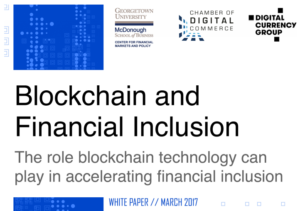 The Blockchain and Financial Inclusion study, released by the Center for Financial Markets and Policy in partnership with the Chamber of Digital Commerce, explores how blockchain could play a key role in accelerating financial inclusion by providing more access and improving the usability of financial services.
The Blockchain and Financial Inclusion study, released by the Center for Financial Markets and Policy in partnership with the Chamber of Digital Commerce, explores how blockchain could play a key role in accelerating financial inclusion by providing more access and improving the usability of financial services.
In this paper, the authors focus primarily on cross-border and internal payments. The aim of the study is to develop key insights for financial institutions and regulators in order to better understand the extent of its impact as they move forward in utilizing blockchain.
The study provides a comparison of regulatory approaches of blockchain and digital currencies, case studies of financial institutions using blockchain to increase the delivery of financial services to the unbanked and underbanked, first-person interviews with relevant industry stakeholders, and extensive secondary research. It examines three markets in particular: India, Kenya, and the Philippines.
MORE Fintech and Blockchain Books can also be found here.
Featured image via pixabay




